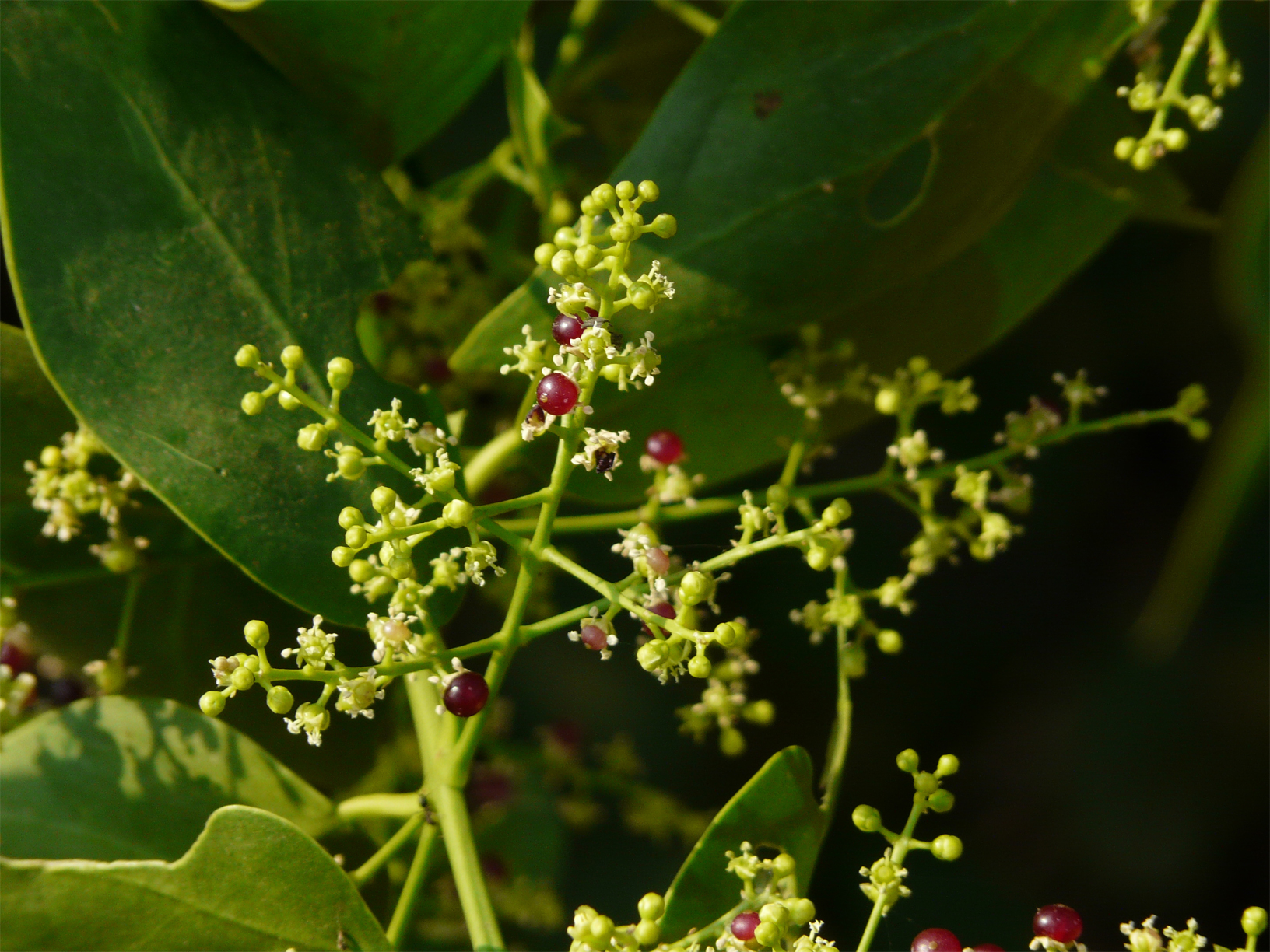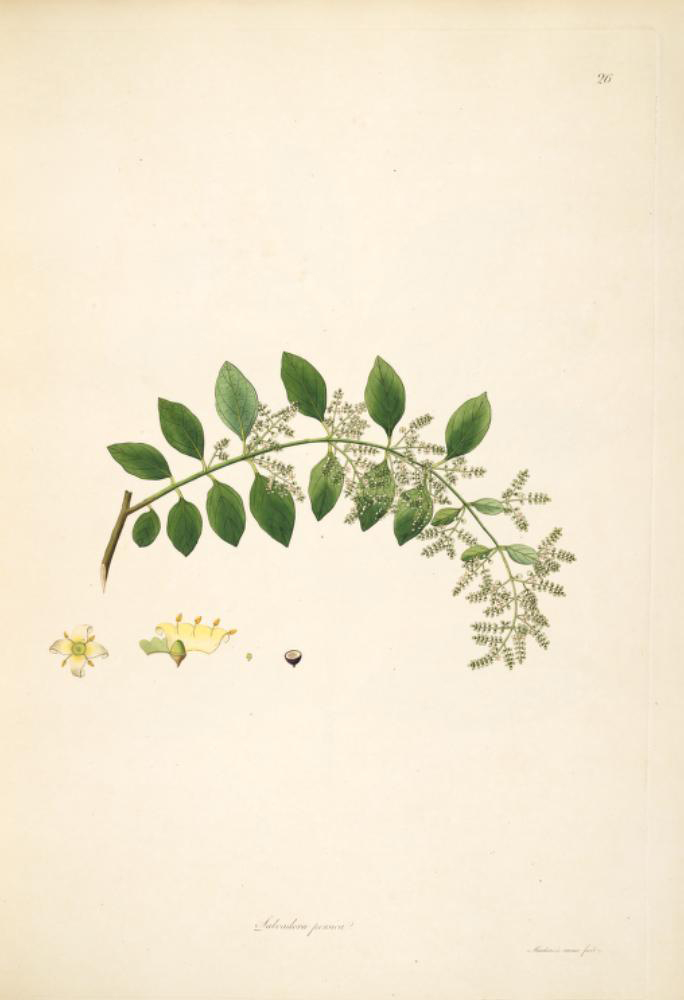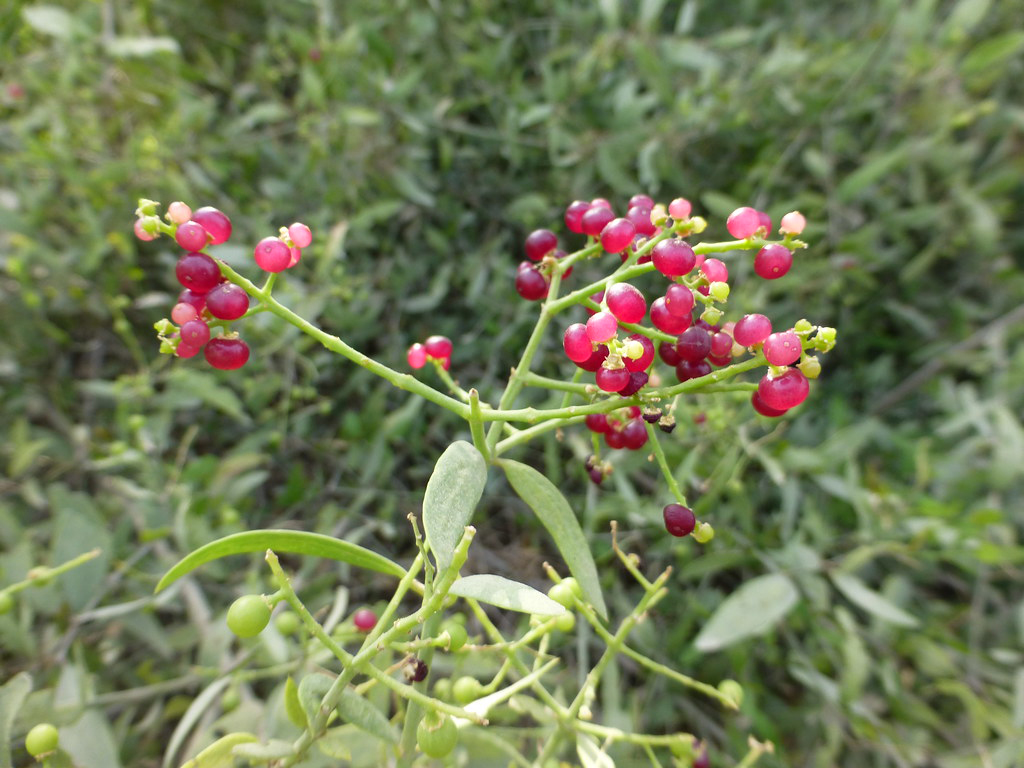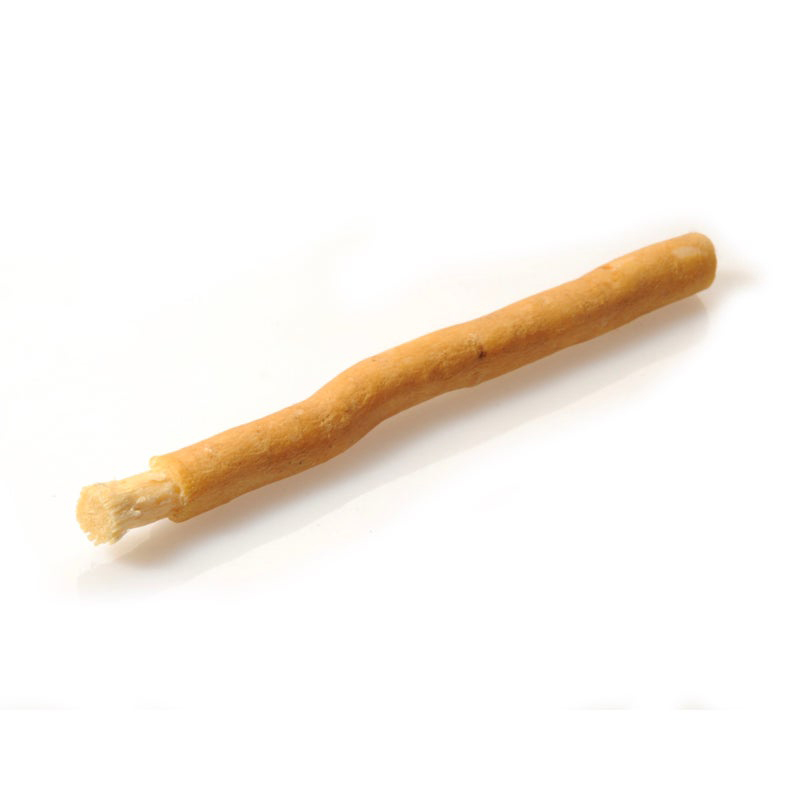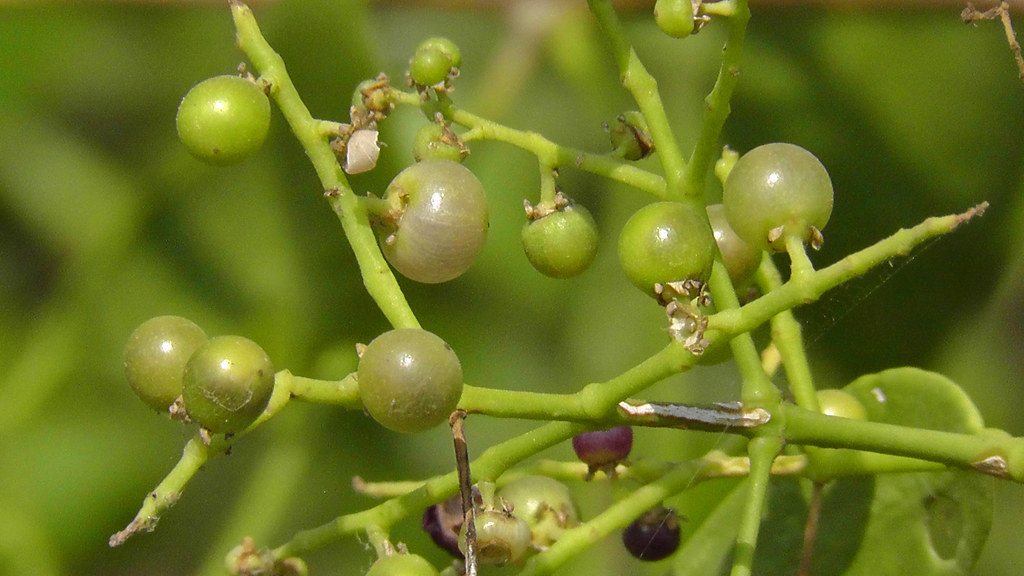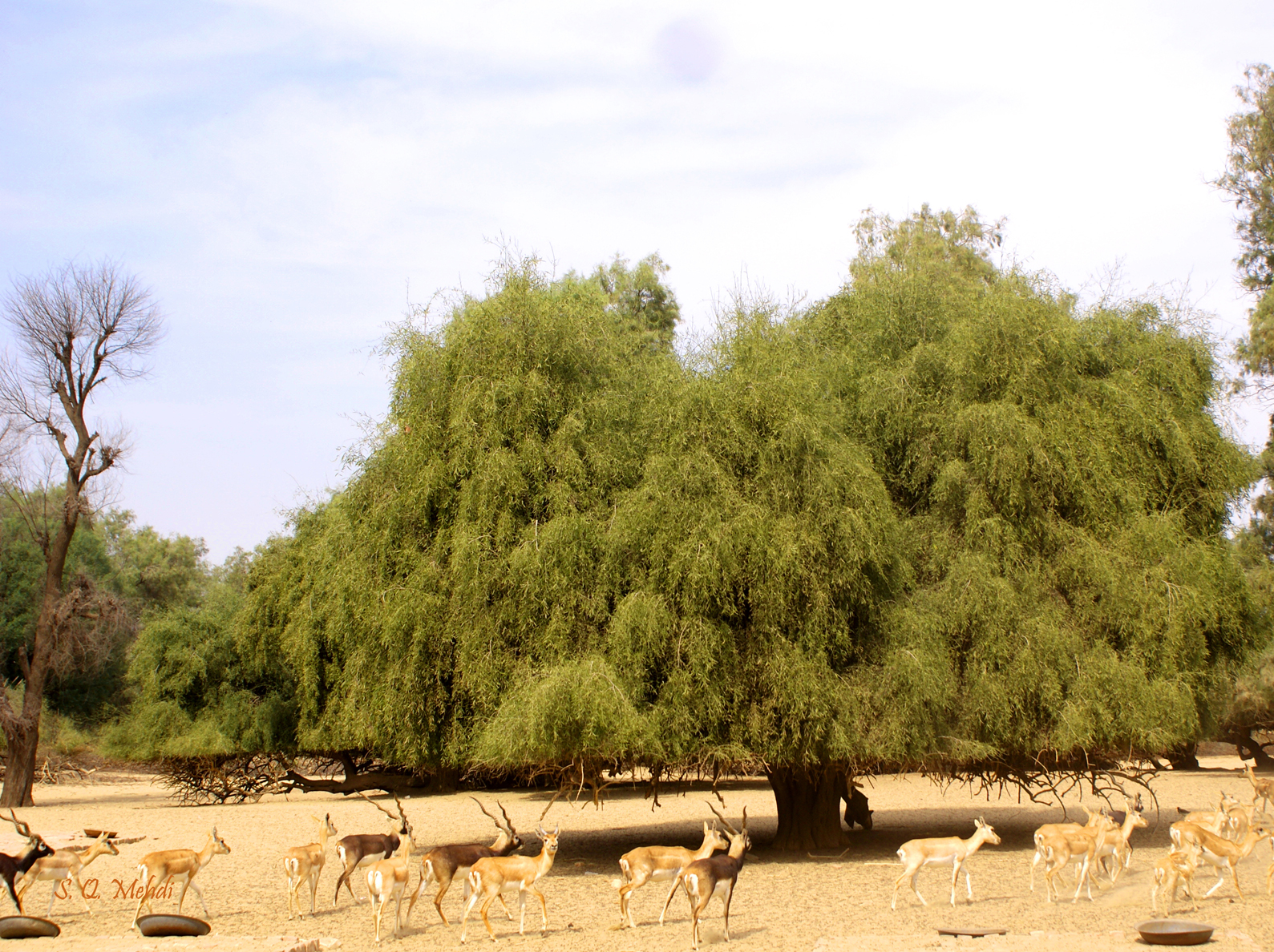Plant
Miswak is a small tree with soft whitish yellow wood and terete, drooping or glabrous branches. Leaves are flaucous, fleshy, elliptic lanceolate or ovate about 3.8-6.3 by 2-3.2 cm. Petioles are glabrous and 1.3-2.2 cm long. Flowers are greenish yellow in axillary or terminal compound lax panicles of 5 to 12.5 cm long. Calyx is glabrous and measures 1.25 mm long. Corolla is about 3 mm long, very thin, persistent and deeply cleft. Flowers are followed by a drupe which is globose, smooth, red and 3 mm in diameter.
History
Miswak is known as a popular teeth cleaning stick throughout Arabian Peninsula and wider Muslim world. Fresh leaves are consumed as salad and also used in traditional medicine. Flowers are small, fragrant and is a stimulant and mildly purgative. Berries are small or could be barely noticed and consumed both fresh and dried. Woods are used for firewood and charcoal. In Namibia, mustard bush is used as a drought resistant fodder for cattle. Seeds are used for extracting detergent oil.
Health Benefits of Miswak
- Healthy teeth
Miswak stick helps to combat tooth decay and also the onset of cavities. These days, people are eating cavity causing sugar for which protection against tooth decay have become a must. It encourages saliva production that counteracts tooth decay from inside out.
Miswak stick has natural sodium bicarbonate, calcium oxide and sodium chloride which works together to strengthen tooth enamel. It effectively counteracts cavities without the use of special treatments and toothpastes.
- Control bacteria
A human mouth contains different kinds of bacteria. Some are required for oral health and assist digestion whereas others could be harmful and causes erosion of tooth enamel. Miswak with its antibacterial effects control the levels of bacteria. The balance of bacteria is directly associated with other benefits of using Miswak stick.
- Prevent plaque
Buildup of plaque is formed from a layer of bacteria which covers the gums and teeth. When left untreated, this layer buildups and causes teeth yellowing, gum problems and even teeth loss. Its antibacterial properties assure this problem does not occur. The normal toothpaste and toothbrush does not have ability to prevent plaque buildup as it does not possess the natural bacteria fighting properties.
- Teeth whitening
Miswak stick offers one whiter teeth. Besides prevention from plaque buildup, it combats the stains caused by foods and drinks such as tea, coffee, tobacco and other food products. It eliminates the buildup which causes yellow stains on teeth of those who drink and smoke on regular basis with no good oral hygiene.
- Freshens breath
The use of Miswak controls the bacteria in the mouth. The major cause for halitosis and malodor is the presence of bacteria. Brushing with normal toothpaste can relieve bad breath temporarily. The root cause for bad breath is associated with diet and untreated gum disease. Miswak promotes saliva. Its antibacterial properties promote the production of saliva and minimize the bad breath.
- Gum health
Maintaining gum health is crucial like healthy teeth as the gums protects the roots of the teeth allowing standing strong through all chomping and chewing. Miswak has anti-plaque and anti-bacterial properties which allow gum to heal and remain strong with continue use. It lowers the risk of gingivitis development that makes the gums sore as well as sensitive. It prevents progress of gingivitis into periodontitis that causes irreversible effects on structure of jawbone.
- Lowers pain
Miswak sticks contain analgesic properties that help to alleviate pain caused by gum disease and inflammation. The use of miswak stick promotes healing of these areas and numbs the pain to make the healing process much comfortable. Brushing with Miswak stick makes the unhealthy gums to feel better.
- Cancer treatment
Besides lowering gum disease, better breath and teeth whitening, Miswak sticks helps to combat cancer. Miswak sticks are a natural anti-carcinogenic that helps to lower the development of cancer types. The antioxidant enzymes such as polyphenols, catalase and peroxidase.
Traditional uses
Leaves
- Leaves are used as an anthelmintic, analgesic, diuretic, tonic for liver, deobstruent, ozoena, scabies, piles, leukoderma, strengthen teeth and lower inflammation.
- In Punjab, leaves are considered as an antidote to poison and in Bombay, it is applied externally for rheumatism.
- Leaves juices are used to treat scurvy.
- Fresh leaves are used for treating asthma, cough, rheumatism, scurvy and piles.
Fruits
- Fruit has carminative, deobstruent, lithontriptic, diuretic and stomachic properties which is useful for biliousness and rheumatism.
- In Sind, it is used for snake bite.
Root bark
- Use the decoction for gonorrhea and vesical catarrh.
- Bark decoction is used as a tonic for amenorrhea. Take a half of tea cup twice daily.
Stem bark
- Stem bark is used for gastric problems.
Seeds
- Seeds are diuretic, purgative and tonic.
- Seed oil is used on skin for rheumatism.
References:
https://www.researchgate.net/publication/221732798_Salvadora_persica
https://pdfs.semanticscholar.org/bd08/e191d9eb133b36b6db7d04a36a54bd4c05e9.pdf
http://www.flowersofindia.net/catalog/slides/Toothbrush%20Tree.html
https://indiabiodiversity.org/species/show/265610
https://en.wikipedia.org/wiki/Salvadora_persica
https://en.wikipedia.org/wiki/Miswak
Comments
| Miswak Quick Facts | |
|---|---|
| Name: | Miswak |
| Scientific Name: | Salvadora persica |
| Colors | Red |
| Shapes | 3 mm in diameter, globose, smooth, 5-10 mm in diameter |
| Taste | Warm and pungent |
| Name | Miswak |
|---|---|
| Scientific Name | Salvadora persica |
| Common/English Name | Miswak (tooth brush) |
| Name in Other Languages | English: Mustard tree; Hindi: meswak (मेस्वाक), Peelu (पिलु, पीलू); Marathi: khakan, pilu (पिलु); Tamil: uka (உகா); Telugu: gunnangi (గున్నంగి); Kannada: gonimara (ಗೊನಿಮರ); Sanskrit: gudaphala (गुडफल), pilu (पिलु); Gujarati: Piludi (પીલુડી) Kannada: Gonimara (ಗೊನಿಮರ); Oriya: Pilu, Toboto, Kotungo |
| Plant Growth Habit | Well-branched, evergreen shrub |
| Plant Size | 15 to 30 feet high |
| Branches | Drooping, glabrous, terete, finely striate, shining |
| Stem | Grey or whitish grey |
| Leaves | Glaucous, 3.8–6.3 by 2–3.2 cm in size, elliptic lanceolate or ovate |
| Flowering Season | January to April |
| Flower | Greenish yellow |
| Fruit shape & size | 3 mm in diameter, globose, smooth, 5-10 mm in diameter |
| Fruit color | Red |
| Fruit Taste | Warm and pungent |
| Seed | Globose, erect, smooth, brown, 1.4 mm in diameter |
| Fruit Season | April to June |



